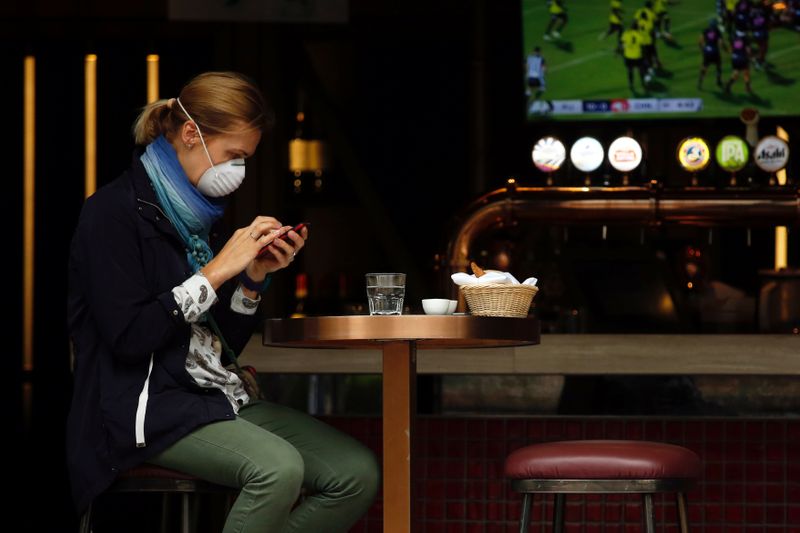By Donny Kwok and Ryan Woo
HONG KONG/BEIJING (Reuters) - Governments in Asia are preparing measures to head off a new wave of coronavirus cases as people flee an explosion of the disease in Europe, North America and the Middle East.
As the world mobilizes to battle the virus, China, Hong Kong, Singapore and Taiwan have been relatively successful in curbing the spread so far.
But a surge in imported cases in recent days has raised alarm that those efforts could rapidly unravel.
"In many countries the number of confirmed cases can be described as explosive," Hong Kong leader Carrie Lam told a press briefing on Tuesday.
"If we don't adopt some strict measures...I'm afraid all precaution efforts done in the past two months would be wasted."
The latest tally from mainland China, the original epicenter of the coronavirus, showed 21 new confirmed cases on Monday, of which 20 involved infected travelers arriving from abroad, mostly Chinese nationals. Hong Kong said most of the recent confirmed cases in the past two weeks were imported.
In Taiwan, 24 new cases up to Tuesday were all imported, while South Korea had 44 new infections involving infected travelers as of Sunday.
Singapore confirmed 17 new infections on Monday, its biggest daily jump in cases, with 11 of those imported.
The rush to flee virus hotspots in Europe and the United States has pushed up the price of flights. A ticket from London to Hong Kong was going for up to HK$50,000 on Monday night as people tried to get to the city before it imposed tougher restrictions.
"It is safer home than in Britain as the policy to contain the outbreak under Boris Johnson is doubtful," said Ling, a Cambridge University student after landing in Hong Kong wearing a surgical mask and rubber gloves.
The number of confirmed coronavirus cases in Britain rose to 1,543, up from 1,372 the day before, the health ministry said on Monday. The British death toll rose to 55.
Four of Hong Kong's 157 confirmed coronavirus patients have died, while more than 3,200 people have died from the disease in mainland China, the highest number of fatalities.
TOUGHER RESTRICTIONS
Measures in China, Hong Kong and Singapore, include city-wide lockdowns, border tightening, contact tracing efforts and strict social distancing.
The virus has already taken a heavy economic toll, especially in mainland China and global financial hub Hong Kong, so any rise in new cases could be devastating.
Hong Kong on Tuesday toughened measures on travelers, requiring 14 days of quarantine for those entering the city as of midnight on Thursday, and joined Singapore in advising against all non-essential travel.
China said all inbound, non-transit travelers to Beijing need to be isolated for 14 days at designated quarantine venues, mostly hotels in the city.
Macau, the world's biggest gambling hub, on Tuesday banned the entry of all non-residents, a move likely to have a significant impact on the already struggling casino industry.
How seriously authorities in Asia take the virus battle has been underscored by punishments meted out or threatened to those who violate quarantine rules or give false information about their whereabouts or travel history.
Taiwan said those who do not follow home isolation or quarantine rules could be fined between T$100,000 and T$1 million (US$ 3,300- US$33,000), and has advised people not to travel abroad at all.
"We held firm to block the first wave of infection, but a new wave is coming, so everyone should cooperate with disease prevention efforts," Taiwanese Health Minister Chen Shih-chung told a news conference on Monday.
BOOMERANG EFFECT
While the imported infections in mainland China are still modest in number - 143 cases so far - authorities are concerned that virus carriers could trigger a second wave.
The first imported case was reported in late February in the northwestern Ningxia region involving a traveler flying in from Iran.
More cases quickly arrived from Iran, a hotspot with nearly 15,000 infections so far, followed by the first infected travelers from Italy in the first week of March.
Soon, the infected were spotted on flights from countries including Spain, Britain, France, the Netherlands, Switzerland, the United States, Egypt, Saudi Arabia and the United Arab Emirates.
The Philippines, Indonesia and Thailand entered the list this week.
